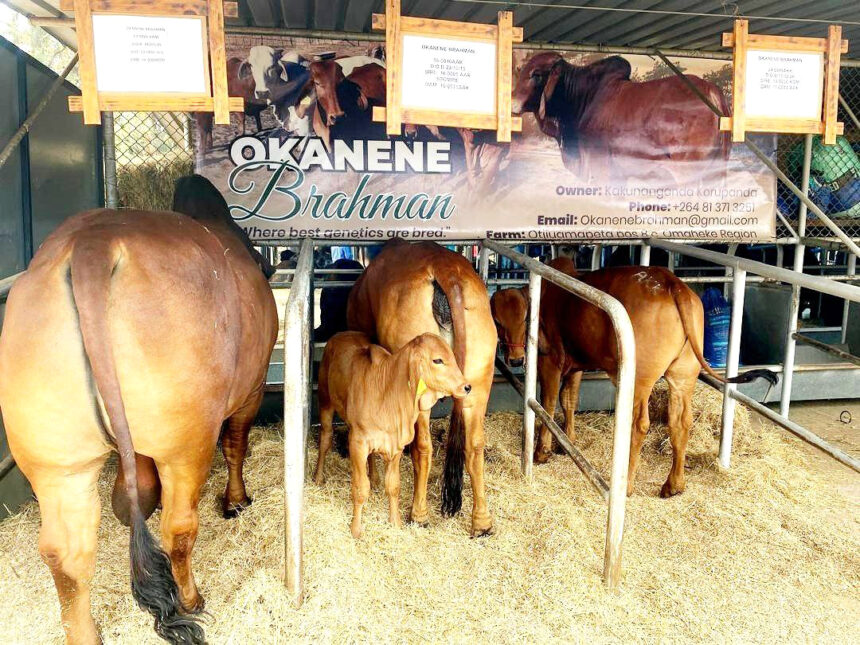Zebaldt Ngaruka
EPUKIRO – One of Omaheke region’s renowned Brahman stud breeders Kakunanganda Korupanda said running a successful Brahman stud enterprise in a communal setup is a challenging undertaking, but perseverance has kept him going.
He farms at Otumbonde village in the Epukiro constituency, and is the owner of Okanene Brahman Stud, which is one of the leading homes of top-quality red Brahman bulls and cows in Omaheke.
But it has not been an easy journey for him, especially having to rear stud animals in the communal area, where grazing space and water sources are in constant short supply. Stock theft is another issue hampering his operations.
He said communal farmers have proven and continue to prove that they are eager and ready to compete with commercial farmers, but the lack of land and water remains a challenge that needs the assistance of the government.
“Our fellow competitors [commercial farmers] have large portions of land, where they easily control their breeding stock.
We, on the other hand, are struggling with access to land where we can control the productivity of our animals. It will be good for stud breeders to be considered as a priority in the government’s resettlement programme.
We are injecting a lot of resources into our operations to contribute to the country’s beef industry. Our contributions must be seen, and we must also be given adequate land to continue producing for the country,” requested the farmer.
He argued that the laws that restrict fencing in communal areas must be reviewed and amended to cater for various farming undertakings.
“Government is on the one hand preaching self-sustenance amongst farmers, but then goes on to restrict us from fencing off a bit of land for production. One wonders how we will cope and produce under such conditions.
In our case, we also have another small area at Otjiuamapeta, where we keep some of our stud animals, but the scarcity of water, grazing space and stock theft is a problem. Another challenge is the poison plant that kills our animals,” he highlighted.
But despite the many challenges, Korupanda is undeterred, and his perseverance recently paid off at the Windhoek Industrial and Agricultural Show, where his Brahman stud bull Pule emerged victorious in the reserve senior Brahman bull category as well as in the breed champion bull section, sweeping aside tight competition from commercial farmers.
Great genes
His bull is an offspring of Hot Chocolate, an outstanding bull from the Komboro Brahman Stud stable, owned by communal stud breeder Ace Kavari, who is based in the Eiseb Block in the Omaheke region.
Korupanda shared that it takes years of persistence and self-belief to produce quality animals in a communal setup.
“It is a mountain to climb when farming in these conditions, especially taking care of stud animals in a communal setting. One must dig deeper into his pockets to sustain operations. That is why I’m calling for assistance around resettlement farms, or even soft loans to release some load off our shoulders. We want to contribute to the beef sector, but a bit of assistance will go a long way,” he added.
His biggest inspiration is his father, Andrew Korupanda, who is a registered Brahman stud breeder with the Namibia Brahman Stud Breeders’ Association.
His father joined the association in 1984, and started competing in the country’s elite show in 2001. He followed in his father’s footsteps, and is now showcasing his stud animals under the Okanene Brahman Stud stable. From his vantage view, the future looks bright for Okanene Brahman Stud.
His words to fellow communal farmers is: “Let us not lose hope. The stud breeding industry is a marathon, and you reap rewards if you work hard. Today you are a winner, and tomorrow, someone else will win”.
His winnings at the Windhoek Show came with rewards – not only in terms of recognition but it has broadened his client base.
“The demand for bulls is there, and we need to produce more despite all the odds. I am even receiving calls from people abroad, enquiring about the availability of bulls and applauding me for the quality of the animals. That motivates me to work even harder,” he exclaimed.
– zngaruka@yahoo.com


